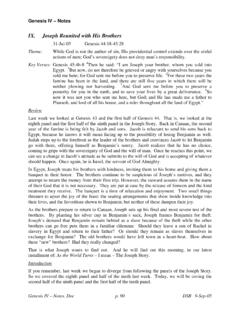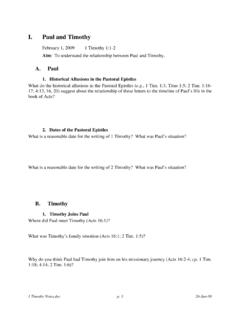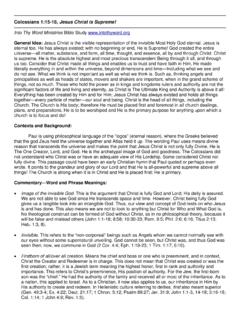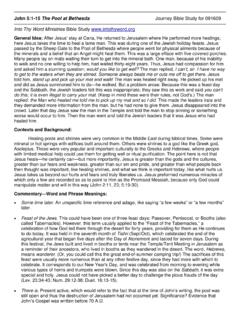Transcription of III. Lesson 3: The Prayer for Knowledge – Ephesians 1:15-23
1 III. Lesson 3: The Prayer for Knowledge Ephesians 1:15-23 . October 17/18, 2007 Stuart chapter 3. Aim: To pray for one another that we may grow in the Knowledge of Jesus Christ. In the remainder of the chapter, Paul prays for the Ephesian church based on what they already have. This is the correct order: we pray for what we already have, and then we pray for what we need. The gist of this Prayer is that God, who has planned and accomplished the salvation described in 1:3-14, might complete it as His people grow in Knowledge of Him.
2 For Paul, the Knowledge that God was working was an inducement to Prayer , not an excuse for neglecting it. It was because God was at work that he could pray with confidence. Paul's statements of what he is praying for follow a typical Greek construction: he says what he is praying about first; then he uses a purpose clause to indicate why he is praying in this way. He does it twice in this passage. In verse 17 he says that he is praying that God might give the Ephesians the Spirit of wisdom and revelation in order that they may know Him better.
3 Then in verses 18 and 19 he says that he is praying that the eyes of their hearts may be enlightened in order that they may know three things. Put together, it is really one great Prayer for Knowledge : Knowledge of God and a fuller Knowledge of the elements of salvation, consisting in our hope, our inheritance, and the power available to us through the Lord Jesus Christ. A. Paul's Prayer (Eph. 1:15-16). 1. Faith & Love (1:15). Paul the pastor has a profound and continuous sense of gratitude. What is moving him is the report that the early Christian community is not only exercising faith in Christ, but is showing that faith through love for one another.
4 The fruit of authentic faith is always love. Paul is expressing his joy and delight that this kind of love is flowing from the faith of these people. Faith (pistis) has three aspects to it. It is knowing, believing, and trusting. A person comes to know what the gospel message is; he believes it to be true; and then he commits himself to what he knows and believers. He relies upon it, by putting himself in the hands of the Christ whom the gospel proclaims. This is what had happened to the Ephesians . Faith does not think about itself.
5 Its attention is all fixed on Christ. This is how the Ephesians spoke and behaved, and so Paul knew that they had indeed become true Christians. In addition to their faith in the Lord Jesus, the Ephesians had love for all the saints.' For love,'. Paul uses the word agap . What does this mean? It means to seek another person's good, however much it costs me personally. It is a sacrificial word. It is the word usually used of Christ's love for us. It means working for another's welfare, even if I die in the process. This is the sort of love the Ephesians had.
6 But for whom did they have it? Paul tells us. It was for all the saints.' The New Testament speaks of saints' (hagios) in the plural, but never in the singular. The word refers to that whole company of people who have been set apart by God, for God. Only three times are believers called Christians' in the New Testament, but they are called saints about sixty times. The Ephesian believers loved every one of them. Ephesians p. 25 14-Oct-07. Ephesians Lesson 3. Love for all the saints' characterizes every person who has been truly converted.
7 It is a brand- mark which is clearly visible and impossible to remove. Those who are in the family love those who are in the family. This is a fact which, for example, the apostle John stresses again and again (1 Jn. 2:9-11; 3:14; 4:7-8; 4:20-5:1). 2. Thanksgiving & Intercession (1:16). What do you do when you hear of conversions? You should thank God. That's what Paul did. When he learned what was happening at Ephesus, he went to God and thanked the Lord for them. Two features of the apostle's Prayer life are in evidence here.
8 First, we see the place of thanksgiving in his Prayer . He taught others that praise should be the unfailing accompaniment of intercession (Eph. 5:19-20; Phil. 4:6; Col. 3:15-17; 1 Th. 5:18). Secondly, we see its constancy. With ceaseless thanksgiving went ceaseless intercession. He did not do this just once, or even a few times. Again and again he thanked the Lord, ceaselessly. It was a constant theme in his prayers. Paul exhorted others to pray constantly' (1 Th. 5:17; cp. Eph. 6:18; Rom. 12:12; Col. 4:2). Paul was a long way away.
9 Besides, he was in prison. He could not strengthen the Ephesians by his ministry. But he could positively help them by his prayers. He spoke to God about them;. and he did not stop speaking to God about them. B. Who We Should Know (1:17). In 1:1-14, Paul gives thanks and glory to the Lord for the abundant blessings He bestowed upon the believers. In 1:15, Paul begins his Prayer for wisdom and revelation for his readers in the Knowledge of God. What is the difference between wisdom and Knowledge ? What Knowledge is Paul speaking about in 1:17?
10 Why then does Paul pray for revelation as well as wisdom? 1. The Father of Glory (1:17a). In verse 17, Paul uses Jesus Christ and glory interchangeably. If we are in Christ, we are in glory. If you want glory, you come to Christ. If you come to Christ, you get glory. The God of glory bestows glory upon us in Christ. 2. The Spirit of Wisdom and Revelation' (1:17b). Paul's Prayer for wisdom and revelation is similar to his other recorded prayers (cp. Col. 1:9;. Phil. 1:9). After Paul blesses God for choosing us in Christ, he prays that his readers may grasp the fullness of God's riches through Christ Jesus.











